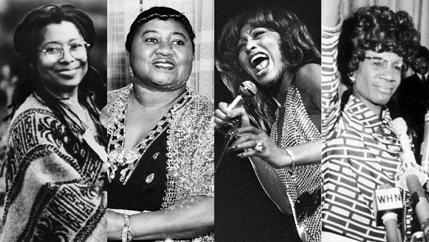
28 minute read
Fitness Doctor
from March 2022
KAHLIL CARMICHAEL THE FITNESS DOCTOR
Kahlil Carmichael MAPCC, MDIV, CPT is the pastor of Live Well Church, in Somerset, New Jersey. He is a fitness specialist at The Fitness Doctor, a fitness and wellness consulting company; and the author of 50 Tips for a Better You. He is a contributor to Guideposts magazine. His first publication, Living Longer Living Better, is available now. Go to www.livewellchurch.org for more information.
Advertisement
Making Time for YOU
March is Women’s History month; let’s celebrate all of the beautiful, hard-working women in our lives. As I make rounds at the hospital, I see women immersed in assignments, in the same place for hours–sitting at their desks. I witnessed my very own wife on a Zoom call from 8am to 6:30pm! My God, I don’t know how you do it! These powerful women deserve our honor. “She sets about her work vigorously; her arms are strong for her tasks.” (Proverbs 31:17 NIV)
We all need to work, and some tasks are urgent. How can you fit in the recommended 30 minutes of exercise daily when you can’t step away? The Fitness Doctor has the answer! I have developed an eight-minute routine designed for the office environment and you can repeat it multiple times during the day to meet your fitness goals. It will also help eliminate stiffness, neck and back pain, and the dreaded hip spread.
Start with these seated stretches: • Put your hands flat on the desk in front of you then tuck your chin into your chest while rounding your back. After holding for several seconds, arch your back while looking up. Repeat.
• Then, holding both hands shoulder level and shoulder width apart, raise hands over your head while arching your back, then return to the original position. Repeat.
• Next do a side stretch. Reach across your body with one hand and grasp your outer hip. Lift your other arm and lean sideways, holding for 30 seconds.
Repeat.
These stretches will mobilize the spine and reverse hunching, reducing fatigue by increasing blood supply and nutrients to your muscles. Stretching wakes and warms up the muscles. No more standing up after hours of sitting and almost collapsing from back spasms! Chair exercises are not just for seniors, add more to get a complete workout! • Chair crunches will engage and strengthen the core
• Knee extensions will strengthen your quadriceps and loosen the knee
• Single-leg calf raises will contract the calf muscle and stretch the ankle
• Seated marches or knee raises to stretch the leg
• Sit and stand several times, waking and strengthening your leg muscles
• Investigate getting a standing desk for your workstation
• Go for a stroll; inside or outside!
Working from home and sitting in front of a camera all day can be exhausting. But remember, movement and physical exercise is medicine. Do take a few moments and start moving right in the comfort of your office.
Here is a YouTube link to a 12-minute workout you can do 3 days per week. https://youtu.be/E625Kq64XmQ
Live well and prosper.
Fitness training is available through the Live Well Church FITCARE program, offered at the Fitness Doctor Studio in Somerset, New Jersey. Please call Karen Beasley at 732-912-4435 to schedule a free assessment.
Disclaimer: The information contained in this column is of a general nature. You should consult your physician or health care professional before beginning any exercise program or changing your dietary regimen.
Women MakingHistory Black Then and Now
—TPC STAFF
Ruby Bridges
At the tender age of 6, Ruby Bridges was the first African American to integrate a white school in the south in 1960. It was the first test case following the decision of Brown v. Board of Education that separate was not equal. Ruby’s family felt strongly that she should be given the best educational opportunities even when her family faced consequences in segregated New Orleans, Louisiana. Her father lost his job and grocery stores refused to sell to her mother. Even her share cropping grandparents were evicted, forced to leave their home. “The Problem We All Live With,” painted by Norman Rockwell, famously celebrated her courage on her first day of school. Bridges wrote two books based on her early experiences, and she continues her lifelong activism for racial equality, founding The Ruby Bridges Foundation in 1999.
Jeannette J. Epps
Amanda Gorman
Jeannette J. Epps’ love for science informed her early career plans to become an astronaut. During graduate school she was a NASA fellow and after earning her master’s and PhD, Epps joined Ford Motor Company, working in the scientific research lab with smart materials. She later worked at the CIA in the Directorate of Science and Technology, where Epps spent four months in Iraq trying to find out what happened to Iraq’s WMD (weapons of mass destruction) in 2004. Initially chosen to be the first Black astronaut to live on the ISS (International Space Station) in 2018, NASA pulled her off the mission without explanation. Epps is currently on the team for the Boeing Starliner mission to the ISS, originally slated for 2021. Technical delays and a global pandemic have delayed Epps’s mission, but she continues working at NASA and will be ready when called upon.
American Poet and Activist Amanda Gorman’s writing speaks to Black identity, feminism, marginalization, and climate change. Many were stunned by her youth, beauty, and grace at the 2021 inauguration of U.S. President Joe Biden, where she recited her poem “The Hill We Climb.” In a recent interview with Former First Lady Michelle Obama for Time, Gorman said, “If we look to the Black Lives Matter protests, you see banners that say, 'They buried us but they didn’t know we were seeds.' That’s poetry being marshaled to speak of racial justice. If you analyze Martin Luther King’s I Have a Dream speech, it’s a great document of rhetoric that’s also a great document of poetry, of imagery, of song. Never underestimate the power of art as the language of the people.” Gorman is one of only four poets, including Robert Frost and Maya Angelou, to recite a poem at a U.S. presidential inauguration.
Three-time Team USA Olympic Gold Medalist Tina Charles currently plays center for the Phoenix Mercury in the WNBA (Women’s National Basketball Association). The 6’4” basketball legend is originally from Jamaica, Queens and traces her roots to the West Indies. In 2010 Charles was drafted first overall by the Connecticut Sun. Charles established the Hopey's Heart Foundation in 2013 to distribute Automated External Defibrillators (AED) to schools. Charles has also funded a school in Mali. In 2018, Charles was awarded the Mannie Jackson-Basketball's Human Spirit Award for her work on education and heart health. Ms. Charles is also a filmmaker, and in 2019 she made her directorial debut, Charlie’s Records, a documentary about her father and his famous Caribbean record store and recording studio on Nostrand Avenue in Brooklyn.
Constance Baker Motley
Ida B. Wells
Ella Baker
As the United States looks to seat its first woman African American Supreme Court Justice, we should honor a woman who inspired many of the Black women in Law. Constance Baker Motley was a frontline litigator for the NAACP Legal Defense Fund and was involved with many of the most important civil rights cases of the 20th Century, including Brown v. Board. She led litigation that integrated the Universities of Georgia, Alabama, and Mississippi and argued ten cases before the Supreme Court, winning nine. Motley, whose boss was Thurgood Marshall, assisted in nearly 60 cases that were brought before the high court. Even when she faced indignities in court, including judges turning their backs when she spoke, Motley kept her cool. In her autobiography, she said, “I was the kind of person who would not be put down, I rejected any notion that my race or sex would bar my success in life.” Motley entered New York politics in 1965 and became the first African American woman in the state Senate, and the first woman elected Manhattan Borough president. President Johnson appointed her to the Southern District of New York in 1966.
African American journalist, abolitionist, and feminist, Ida B. Wells was born enslaved in 1862. Wells is best known for her anti-lynching crusade in United States in the 1890s. In addition to working as a journalist, Wells published two newspapers, The Memphis Free Speech and Headlight. She also taught in a segregated Memphis school. After the Black owners of a grocery store were lynched in 1892, Wells began investigating and writing about lynchings. After one of her editorials enraged some in the white community, a mob stormed her office, destroying her equipment. A contributing founder of the National Association of Colored Women and the NAACP, Wells was also an activist for women’s suffrage, founding the Alpha Suffrage Club in Chicago. In 2020, Wells was awarded a Pulitzer Prize "for her outstanding and courageous reporting on the horrific and vicious violence against African Americans during the era of lynching."
Recognized by many as the mother of the civil rights movement, Ella Baker played a critical role in crafting and implementing many of the strategies that led to the successes of the SCLC and SNCC in the 1950s and 60s. After the Montgomery Bus Boycott, Dr. King and others sought to create a civil rights organization. Baker, who had been an NAACP organizer, spearheaded the SCLC (Southern Christian Leadership Conference). Without the aid of the internet and social media, she utilized her skills, experience, and contacts to plan events and identify and establish protests and campaigns, selecting and training various individuals to lead them. After seeing the Woolworth’s lunch-counter protests in Greensboro, North Carolina, she wrote a letter on SCLC letterhead calling student leaders all over the South to join and begin working together. Over a weekend of meetings, SNCC (Student Non-Violent Coordinating Committee) was born. SNCC organized Freedom Rides to desegregate buses, held voting rights protests and registration drives, and drew national attention during the Mississippi Freedom Summer of 1964 when three SNCC workers were killed by white supremacists. Not one to seek the spotlight, the unsung hero said in a documentary about her amazing life and accomplishments in the struggle for equality, “I found a greater sense of importance by being a part of those who were growing.”
Fabiana Pierre-Louis, New Jersey’s newest Supreme Court Judge, was sworn into office in 2020, the youngest and the state’s first Black woman Supreme Court jurist. The 39-yearold Pierre-Louis, the daughter of Haitian immigrants, worked as a prosecutor in the U.S. Attorney’s Office and as a defense lawyer with a private law firm. The Rutgers Law Alumna was attorney-in-charge of the Trenton and Camden offices as well as in the general crimes and organized crime and gang units in the Newark office. Rhasheda Douglas, assistant dean of the Minority Student Program at the Rutgers Law Camden, knows Pierre-Louis and said, “In a nutshell, Fabiana’s story demonstrates why it’s critically important for law schools to remain committed to ensuring students from modest backgrounds have access to legal education.”
Soon to be confirmed . . . Judge Ketanji Brown Jackson
Biden’s Nominee for Justice of the Supreme Court of the United States
By Leslie Nash
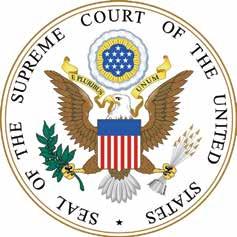
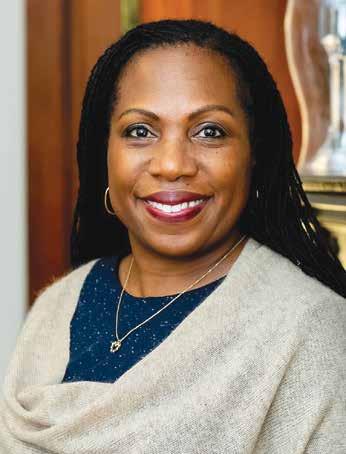
Even in preschool Ketanji Brown Jackson loved the law. Growing up, she watched in admiration as her law-student father read cases and prepared for the Socratic questioning he would face. Both of her parents attended HBCUs and worked in the Miami–Dade School District. Her father, Johnny Brown, Esq., as chief attorney for the school board; and her mother, Ellery, as principal at New World School of the Arts. A debate team star at Palmetto Junior High, she was selected as a school “mayor.” It was in high school that she set her sights on a legal career. President of her class at Miami Palmetto Senior High School, and voted “most likely to succeed,” it seemed she had already planned her path to greatness.
Unfortunately, sometimes great dreamers meet dream killers. Jackson’s high school guidance counselor warned her not to set her goals too high because she couldn’t make it far in the justice system. Jackson shut down all negative criticisms graduating magna cum laude from Harvard University and cum laude from Harvard Law School, where she was supervising editor for the Harvard Law Review.
After Harvard, she clerked with three different jurists including Justice Breyer—in whose seat she will sit if confirmed to the U.S. Supreme Court. At the law firm of Goodwin Procter, Jackson represented clients in criminal and civil appellate matters. She argued big cases such as McGuire vs. Reilly in front of the Supreme Court, representing Massachusetts reproductive rights groups seeking to uphold the prohibition of allowing anti-abortion protestors to harass people in need of reproductive healthcare.
In 2003, Jackson returned to public service as an Assistant Special Counsel for the U.S. Sentencing Commission, an independent federal agency created by Congress to address the injustice in federal courts. She continued her work in public service as an Assistant Federal Public Defender in the District of Columbia, where she represented low-income criminal appellants before the U.S. Court of Appeals for the D.C. Circuit.
Nominated by President Obama to serve on the District Court for the District of Columbia, Jackson was confirmed with bipartisan support. After President Biden’s nomination in 2021 to the United States Court of Appeals for the D.C. Circuit, Judge Jackson received dozens of letters in support of her nomination, which helped pave the way for her nomination as a Supreme Court Justice.
Though it may seem Jackson has led a charmed life, it wasn’t always the case. Hard work, dedication, and focus on her goals were uppermost in her plan. In an interview with The Washington Post, she said she felt the “slings and arrows” of bias, yet decided not to care about “slights and misperceptions and underestimations that came my way. What I do remember is often thinking, ‘Hmm, well, I’ll show them.’” Indeed.
Living Life Out Loud
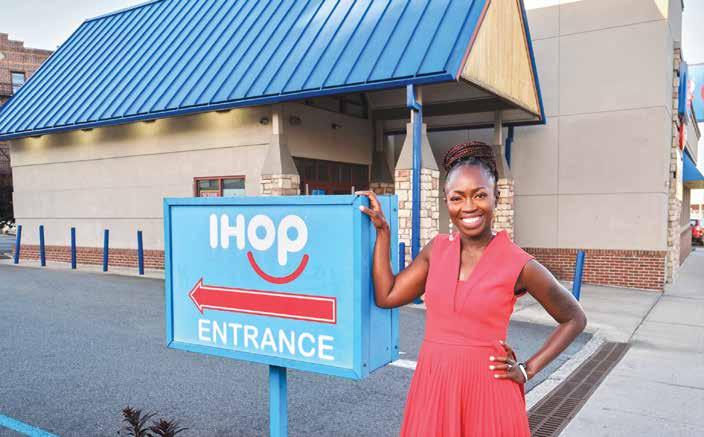
Business Mogul Adenah Bayoh Builds Her American Dream
By Glenda Cadogan
The opening of Adenah Bayoh’s first IHOP franchise restaurant in Irvington, New Jersey, was a grand affair filled with excitement for family, friends, and the community. The 27-year-old owner, however, an immigrant from Liberia who had escaped the civil war there at the age of 13, said emotional turmoil engulfed her. “People were
celebrating and I was thinking about the journey,” she explained. “The truth is, by the time the restaurant opened I was
bankrupt. I really didn’t have a proverbial penny to my name. I stood there, looked at the restaurant and all I felt was pain.”
It took a few years and three IHOPs later before Bayoh, 43, could recalibrate the pain of those trials into the pleasures of triumphant joy. “I remember the day some years later when I pulled into the parking lot of the restaurant and realized that despite all the hardships it was still standing,” she said, adding, “And so was I. I broke into tears.” Now that flagship IHOP located at 1212 Springfield Avenue in Irvington Township exists as a testament to Bayoh’s strength. “I use it as a reminder that no one broke me. I am still standing and will continue to do so and make an impact.”
Indeed, Bayoh’s impact in Northern New Jersey and beyond is a gigantic one. Founder and CEO of Adenah Bayoh and Companies, she owns multiple IHOP restaurants in Newark and Paterson. With her partner, Zadie Smith, a delightful farm-to-table restaurant called Cornbread has locations in Maplewood and Newark. A Brooklyn Cornbread will open March 29, 2022. Her latest enterprise, Urban Vegan, located near her Newark Cornbread location features fast, casual vegan dishes sourced locally and at affordable prices. And there’s more. The mother of two manages a $250 million
real estate portfolio in urban redevelopment projects, which includes multi-family, residential, and commercial properties.
As an entrepreneur, multi-restaurant franchisee and developer, real estate magnate, immigrant, and war survivor, Bayoh has a lot of stories to tell. Her favorite is the heroism and passion of her late grandmother. Only about 8 years old at the time, Bayoh related with sober clarity what happened the day armed rebels came to Foya, the tiny village where her family lived. “They got hold of my aunt and stripped her naked. Everybody froze except my grandmother, who stepped into action. In our tradition it’s like a curse to look at naked older women. So, my grandmother started stripping off her own clothes. One of the rebels abruptly ordered the others—who by this time were about to rape my aunt— to stop. My grandmother then took her lapa (wrapped traditional skirt), covered my aunt and walked her away.” The incident remains imprinted onto Bayoh’s consciousness as the ultimate act of bravery. “I always say to myself that if my grandmother could have the courage to save someone else by standing up to men with guns, then I can do it, too.”
In her journey through the challenging and complex world of commerce, Bayoh may not have encountered men with guns, but she certainly had her fair share of boardroom battles with their attitudes and prejudices. “I have been in rooms where it was clear to me that others felt I did not belong. But to quote the late Justice Ruth Bader Ginsburg: ‘Women belong in any room where decisions are being made,’” she said.
It was a cold day in May when Bayoh landed at JFK International Airport in New York, the lure of the Statue of Liberty beckoning to the “tired, poor huddled masses.” At the age of 13 she was in the care of the airline having traveled with her younger brother as unaccompanied minors. Waiting at the terminal were her parents, already resident in America. Their excitement of coming to America was high, yet what Bayoh remembers most about her feelings could be summed up in a few words —potato salad and McDonalds. “For some reason, I used to daydream about eating potato salad,” she recalled with a question in her voice.
A far cry from her village in Africa where running water did not exist and rebels ruled the land— wonderful; America. The bold prints of the sign just before the Van Wyck Expressway read “Welcome To New York!” and the tall buildings were intimidating. But none of it could match the fire that burned in the heart of the Liberian teenager. No wonder. She is the granddaughter of Jenneh Viskinda; a woman who not only stopped a rebel attack but had a farm, land, and real estate. Grandma Jenneh’s words of wisdom play like a stuck record in Bayoh’s ears every time her back is against the wall. “She would always tell me, ‘The darkness can never trump the light.’”
With plans to open four more restaurants in New Jersey and New York, Bayoh’s light eluminates a path for other young girls to follow. Every successful endeavor comes with a bigger, brighter LOL moment: Adenah is Living Out Loud!
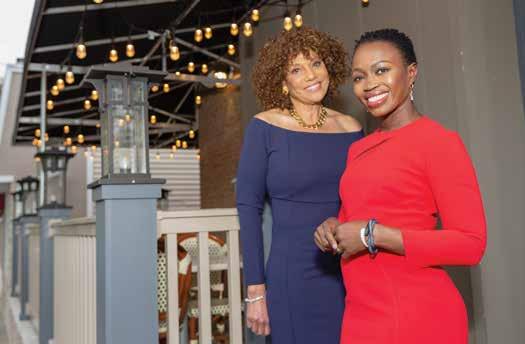
Adenah with her business partner in Cornbread restaurants, Zanie Smith in front of the Maplewood location.
Mayor Baraka Recognizes Choose Healthy Life
L-R: Mayor Ras Baraka, Rev. Dr. David Jefferson Esq., Debra Fraser-Howze and Rev. Calvin Butts
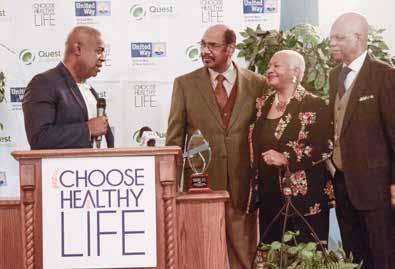
Photo by Raymond Hagans
Newark Mayor Ras Baraka and Healthy Life Founder Debra Fraser-Howze acknowledged the major contribution of the Black clergy to vaccinate Newark residents against COVID-19. The mayor thanked Choose Healthy Life’s lead church Metropolitan Baptist Church, and its Senior Pastor Rev. Dr. David Jefferson Sr. Esq., along with all the pastors from Choose Healthy Life churches across the city.
Choose Healthy Life launched in Newark last February with trained health navigators based in 10 churches across
Newark Faith Community is Recognized for Being Major Contributor to Vaccinating Newark Residents
the city. These houses of worship, in collaboration with local healthcare providers, have hosted over 300 events, delivering testing and/or vaccinations to over 15,000 Newark residents in hard-to-reach communities.
“The work of the Black clergy in our city has been a significant contributor to the success of our COVID-19 testing and vaccination program,” said Mayor Baraka. “Rather than asking our residents to come to a vaccination or testing site – our clergy brought testing and vaccination to the people.”
DiVincenzo Hosts Campaign Kick-off Fundraiser
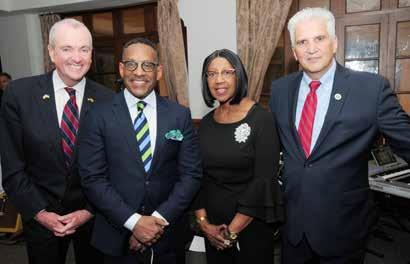
L-R: Governor Phil Murphy, NJ State and Essex County Democratic Chairman LeRoy Jones, Lt. Governor Sheila Oliver and Essex County Executive Joseph N. DiVincenzo, Jr.
AWho's Who in Essex County Democratic leadership showed up at the beautiful Highlawn Pavilion in West Orange, NJ, on March 1st. The Essex County Executive Joe DiVincenzo’s campaign kick-off event at his first fundraiser in four years. DiVincenzo seeks an unprecedented sixth term as Essex County Executive. Guests included Irvington Mayor Tony Vauss, East Orange Mayor Ted Green, Orange Mayor Dwayne Warren, and Montclair Mayor Sean M. Spiller.
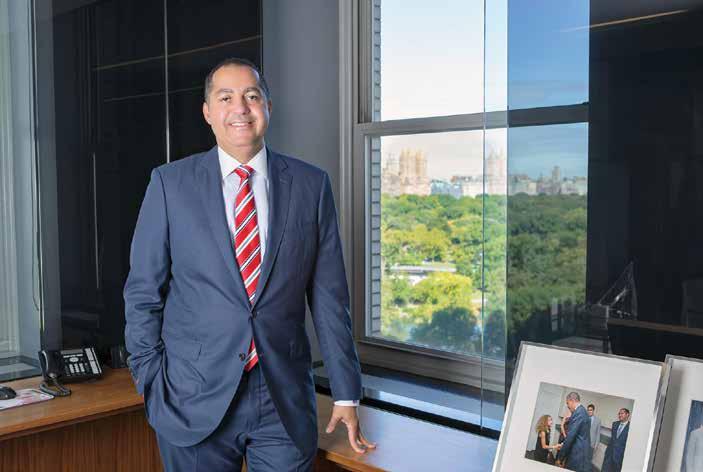
A Dream Deferred Not Forgotten
Don Peebles Aims to Change the Skyline, the Rules, and the System
By R.L. Witter
He always knew he would make an impact. Don Peebles didn’t know how, when, or where, but he was sure of it. Born in DC, he and his mother moved to Detroit when he was three years old. It was a move that would shape his young life in more ways than one. “You had local bastions of Black lawyers and doctors. My uncle was an OBGYN; that’s how my mother got there; her sister and my uncle moved there for his residency,” he explained. Peebles’ best friend was Kerry Gordy, son of Motown Founder and legendary music mogul Berry Gordy. “I felt there was no limit to what I could do. I found myself very optimistic about my future.”
Peebles was molded and inspired by the people around him and the lessons he learned from them. “One of the biggest things I was mindful of early was making an impact. I was eight years old when Dr. King was assassinated. I remember when he was assassinated all of the riots and protests that took place afterward and then Robert Kennedy,” he recalled.
A quick learner, he picked up on some hard truths early in life. “Our system, when it comes to Black Americans, is innately unfair. It is systemically discriminatory and is just as bad—in fact probably worse than when my father was coming along. It makes our futures so uncertain. It mass incarcerates our kids and the moment we look at some other alternative to that, the media and political establishments say, ‘Hey, we’re letting all of these criminals out of jail…’” He began to understand the game and that most Black people were losing. “What gets me up everyday is asking, ‘Is this the best we can do as a country?’ and ‘Why does it have to be so hard?’ I see
other people; I have other friends and they’re playing an insider’s game. Black people in America are playing an outsider’s game.”
As he began his career in real estate development, Peebles found—no, created success. Soon he found himself in the company of Black American icons and leaders. He listened to their opinions and advice then made decisions and moves by following his own instincts. Several years ago, he found himself talking with Rev. Al Sharpton at a function at the Grand Havana Room. As they gazed through the window at the lights and the New York skyline, Rev. Sharpton said, “You see all of those buildings there? Not one of them was built by a Black person. You need to come here and do some business.” One year later, The Peebles Corporation redeveloped the Tribeca landmark at 108 Leonard Street and more success followed.
A Fair Chance When New York State issued a request for proposal (RFP) for the property at 35th and 36th streets, 11th Avenue and Hudson Boulevard West—across the street from the Jacob Javits Center, one block from the High Line, Hudson Yards and the No. 7 subway line, Peebles and his team were ready. Their proposal laid out plans for a skyscraper called Affirmation Tower with hotels, an iceskating rink, commercial office space, an observation deck, a cultural center, and more. They offered a building design that honors Black culture with a look reminiscent of an afro pick and would bring jobs and opportunity to the Black community. But, for whatever reason, the RFP was canceled.
“The State and City of New York gave away dozens of acres for Hudson Yards’ development. They gave an installment sale, payment plan, built a subway station for them, gave them infrastructure and here we have one tiny little piece of property across from the Javits Center and you would think it’s sitting on a goldmine or an oilwell. They don’t want to even give us a fair chance for that and I find that indicative of what the problem is,” said Peebles. “They want to keep us comfortable with disproportionate poverty… We want our share of the American Dream; and that’s what Affirmation Tower says. We’re paying a lot of money —$300 million— providing $1 billion dollars in contracts for minority and women-
cont’d on next page
Artists’s rendering of the Affirmation Tower proposed by The Pebbles Corporation to be built in New York City

Don Peebles
cont’d from previous page
owned businesses (MWBEs), thousands and thousands of jobs. We’re using business in our capitalistic democracy to bring about some social change.”
Dreaming Big With Don Peebles and his team at the helm, Affirmation Tower has the bona fides to bring ownership and pride to the Black community in New York and around the world. “It’s the tallest building in the western hemisphere by roofline, and for that to be done by a Black development team; constructed by a construction company founded by a freed slave and now run by his great, greatgranddaughter—Cheryl McKissack Daniel, president and CEO of McKissack & McKissack— for the New York NAACP to be headquartered there; and to have a cultural center, it says something to our young people across the board and it says something to white Americans too — don’t look at us as not being capable. Don’t down our capacity to be great.”
It’s About All of Us The Affirmation Tower is definitely Don Peebles’ passion project, but not for the reasons one might imagine. At this point in his life, Peebles has created a company and relationships that have built wealth for him and his family. He’s met and socialized with business and political luminaries, and built a life that allowed his son and daughter to pursue their dreams and passions unabated while learning the family business and the life lessons they’ll need to carry on their father’s work. “This is not about me,” Peebles said firmly. “It looks like we played the game so well they had to cancel the game. They said go out and build community support; I did. What this says is if you’re Black, don’t try to get into this game and do it too well, because maybe there’s not a place for you. If New York City is known for anything it’s the skyline. And right now, it says no Blacks allowed. So, being able to look out there and see the tallest building being built is like Obama being president. It’s a big impact.”
Peebles wants people to understand the importance of this project. “This is about us unlocking the doors of economic opportunity. We’ve had people open the doors of opportunity for us; they’ve done it already. So, the doors are being locked and there are bolts on the doors and this time around it’s not water hoses; it’s people smiling at us, saying nice things to us, saying they care… They want to help us get more comfortable where we are but they still are holding those doors closed. The way they get opened is we have to open them.” He continued, “We have to be the ones who knock down these doors. Otherwise, they’re going to be deadbolted and set even firmer for our kids and our grandkids. Affirmation Tower is about knocking down these doors and we’re going to have to crush through, keep going at it to open them up. There’s so much money involved, so much power involved.”
As our time drew to a close, I asked Peebles one more question: Is this building what you want to be your legacy, the signature accomplishment of your real estate development career? Without hesitation he responded, “Affirmation Tower represents opportunity, hope, and real change. It would be the last development project I build. I will move on to doing something else, probably politics.” He smiled, then said with a chuckle, “I’d challenge the system there because I think that needs to be challenged, too.”
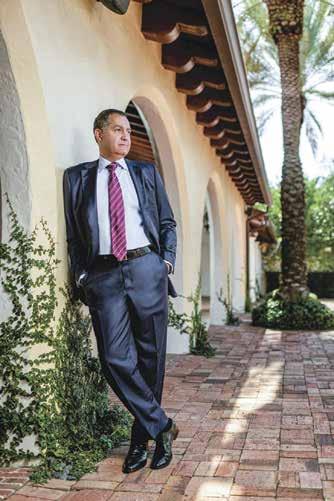
The Positive Community reached out to the New York Governor’s office and local politicians for comment regarding the cancellation of the RFP, but did not receive a response at press time.
george clinton & parliament funkadelic @ 80

with special guests questlove, vernon reid & nona hendryx mar 18
PRESENTS



• Brenda K Starr • George Lamond • Lisette Melendez • Black Sheep • Robin S • Cece Peniston • and many more!
Sat, Mar 19 @ 8PM
Your favorite 90’s dance music stars are here to tear it up! Come dance the night away to dance freestyle, house, dancehall, Latin, and pop.
los ángelesazules
Fri, Mar 25 @ 8:30PM
Mexican band Los Ángeles Azules celebrate 40 years! Join us for all of your favorite cumbia songs… and a few surprises.
urban bush women
Hair & Other Stories Fri, Apr 1 @ 7:30PM; Sat, Apr 2 @ 2PM
Dance performance Hair & Other Stories reflects on race, identity and beauty through the lens of Black women’s hair.


diana krall

Sun, Apr 3 @ 7:30PM
Multiple GRAMMY® Award-winning jazz pianist and world-renowned singer Diana Krall returns to NJPAC.
@NJPAC • 1.888.MY.NJPAC • njpac.org Groups of 9 or more call 973.353.7561 One Center Street, Newark, NJ
disney princess: the concert
Apr 13 @ 7PM
“Be our guest” as we celebrate all of your favorite Disney princesses in an unforgettable evening of song.
alvin aileyamerican dance theater
Fri, May 6 @ 8PM; Sat May 7 @ 8PM Sun May 8 @ 3PM
This elegant, electrifying company celebrates its return to NJPAC with new works and the beloved Revelations.
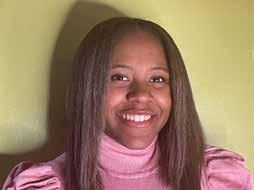
Scout’s Honor: Morristown High student writes children’s book about Alzheimer’s
BY OLIVIA YEPEZ, COURTESY OF THE MORRISTOWN GREEN CONTRIBUTOR
The phrase “Girl Scouts” usually evokes a young girl in a green vest with a plethora of patches. You might imagine her outside a grocery store or on your doorstep, pitching a sale of Thin Mints, Trefoils or Samoas. Morristown High School junior Valencia Julien has been selling cookies and gaining patches since the 3rd grade. Now she has her sights set on the Gold Award, the highest honor for Girl Scouts. She hopes to attain it by writing, publishing and distributing her own children’s book, Giselle Learns About Alzheimer’s.
“When I was in 3rd grade, my grandfather developed symptoms of dementia, Alzheimer’s, and I was fairly confused as to why he would no longer be able to pick me up from school or be able to take me to certain practices,” Julien said. “I realized I wanted to make a tool that would help students …understand what the disease of Alzheimer’s is.” Annually, fewer than 6 percent of Girl Scouts get the Gold Award, according to Edwin Barreto, interim chief financial officer of the Girl Scouts of Northern New Jersey (GSNNJ). Only 106 girls from the counties of Morris, Bergen, Passaic, Sussex and northern Warren earned it last year.
“Valencia’s work on her Girl Scout Gold Award to date is impressive and inspiring,” Barreto said, noting that the Girl Scouts always encourage award candidates to tackle issues of community problems that they passionate about.
Julien started the project in early 2020, just before the pandemic sent students home to their computer screens.
Going for Gold has not been easy. In fact, “everything was just fairly hard.” Quarantines sapped her motivation. And she encountered obstacles familiar to many writers: Deciding on a storyline; and how she wanted characters to look and act; and finding an illustrator she liked, within her budget, and willing to take the assignment. “It took me even longer to find a publicist for the book that was affordable,” Julien said. She wanted physical copies, not just an online edition. But it proved tricky finding a company that would publish a book she plans to give away. Eventually, Julien partnered with Dazzle Printing for hard copies, and with Lulu.com for online publishing.
Completing the book started the Gold Award process. Now she must do community outreach. Julien gave her first reading of Giselle Learns About Alzheimer’s to a group of 3rd-5th graders online. Commanding their attention via computer was difficult. She intends to reach her target audience with more in-person readings, now that the coronavirus is easing. “It’s been a struggle to even get a virtual meeting set up with schools or rec centers in the community,” Julien acknowledged. Yet she is optimistic about achieving the Gold Award soon. “It’s kind of like a full-circle dream come true… It feels like I’ll accept the award on behalf of my grandfather, which feels nice.”




